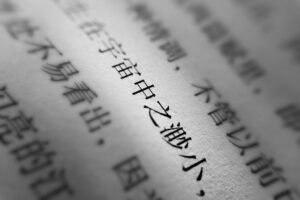Chinese culture has a rich history of expressing love through language. From ancient poetry to modern-day expressions, the Chinese language offers a unique perspective on love and relationships. Understanding the meaning behind Chinese phrases can deepen our understanding of love and help us appreciate the beauty and value of this complex emotion.
Love is a universal language, but different cultures have their own unique ways of expressing it. In Chinese culture, love is often expressed through poetic and symbolic phrases that convey deep emotions and profound meanings. By exploring these phrases, we can gain insight into the Chinese perspective on love and relationships.
Table of Contents
Toggle“Ai” (爱): The Most Common Chinese Word for Love
The most commonly used word for love in Chinese is “ai” (愛). This word can be used to express love for family, friends, and romantic partners. The character for “ai” is made up of the characters for “heart” and “friendship,” symbolizing the deep emotional connection and affection that love entails.
In Chinese culture, love for family is highly valued and often expressed through actions rather than words. Filial piety, or respect for one’s parents and elders, is an important aspect of Chinese culture. Expressing love for family members through acts of kindness, respect, and support is considered a fundamental virtue.
Love for friends is also highly valued in Chinese culture. Friendships are seen as lifelong bonds that should be cherished and nurtured. The concept of “ai” extends beyond romantic love and encompasses the deep emotional connections we have with those we care about.
“Yuánfèn” (缘分): Understanding Fate and Destiny in Love
In Chinese culture, the concept of “yuánfèn” (缘分) refers to the idea of fate or destiny in love. It is believed that two people who are meant to be together will eventually find each other, regardless of time or distance. This concept emphasizes the belief that love is not a matter of chance, but rather a predetermined connection that transcends time and space.
Understanding “yuánfèn缘分” can help us appreciate the journey of finding love. It reminds us that love is not always straightforward or easy, but rather a series of encounters and experiences that lead us to our destined partner. It encourages us to have faith in the process and trust that love will find its way to us when the time is right.
“Qíng” (情): The Emotional Connection in Love
The Chinese word “qíng” (情) refers to the emotional connection between two people in love. It encompasses feelings of affection, passion, and intimacy. “Qíng” is often used to describe the deep emotional bond between romantic partners, as well as the intense emotions experienced in a romantic relationship.
Understanding “qíng” can help us navigate the ups and downs of a relationship. It reminds us that love is not just about the good times, but also about weathering storms and supporting each other through difficult times. It emphasizes the importance of emotional connection and communication in maintaining a healthy and fulfilling relationship.
“Zhēn’ài” (真爱): The Depth and Authenticity of Love
The Chinese phrase “zhēn’ài” (真愛) refers to the depth and authenticity of love. It is a love that is true, pure, and enduring. “Zhēn’ài” goes beyond superficial attraction or infatuation and encompasses a deep emotional connection and commitment to another person.
Understanding “zhēn’ài” can help us recognize and appreciate true love when we find it. It reminds us that love is not just about fleeting emotions or temporary infatuations, but rather a deep and lasting connection that withstands the test of time. It encourages us to seek out relationships that are built on trust, respect, and genuine affection.
“Xiāngsì” (相思): The Longing and Yearning in Love
The Chinese word “xiāngsì” (相思) refers to the longing and yearning that comes with being in love. It is a feeling of missing someone deeply when they are not around. “Xiāngsì” is often used to describe the intense emotions experienced when separated from a loved one.
Understanding “xiāngsì” can help us appreciate the value of being present with our loved ones. It reminds us to cherish the time we have with our partners and to make the most of every moment together. It also encourages us to communicate our feelings and desires openly, so that we can bridge the gap between longing and fulfillment.
“Línghún bànlǚ” (灵魂伴侣): The Concept of Soulmates in Love
The Chinese phrase “línghún bànlǚ” (灵魂伴侣) refers to the concept of soulmates in love. It is the idea that there is one person who is meant to be our perfect match, our other half. “Língyù” emphasizes the belief that love is not just about compatibility or shared interests, but rather a deep spiritual connection between two souls.
Understanding “língyù” can help us appreciate the unique connection we have with our partner. It reminds us that love is not just about finding someone who meets our criteria or fulfills our desires, but rather someone who understands us on a deeper level and complements us in ways we never thought possible.
“Tóngxìngliàn” (同性恋): The Acceptance and Celebration of Same-Sex Love
The Chinese phrase “tóngxìngliàn” (同性恋) refers to same-sex love. It is important to accept and celebrate all forms of love, regardless of gender or sexual orientation. “Tóngxìngliàn” (同性恋)emphasizes the belief that love knows no boundaries and that everyone deserves to love and be loved.
Understanding “tóngxìngliàn” (同性恋) can help us create a more inclusive and loving society. It reminds us to embrace diversity and to challenge societal norms and prejudices. It encourages us to support and uplift those who may face discrimination or prejudice because of their sexual orientation.
“Xīnqíng” (心情): The Importance of Emotional State in Love
The Chinese word “xīnqíng” (心情) refers to the importance of emotional state in love. It is important to be in a positive emotional state in order to give and receive love. “Xīnqíng” emphasizes the belief that our emotional well-being directly impacts our ability to form and maintain healthy relationships.
Understanding “xīnqíng”(心情) can help us prioritize our emotional well-being in our relationships. It reminds us to take care of ourselves and to address any emotional issues or traumas that may hinder our ability to give and receive love. It encourages us to seek support and guidance when needed, so that we can create a loving and nurturing environment for ourselves and our partners.
“Wéiyī” (唯一): The Uniqueness and Specialness of Love
The Chinese word “wéiyī” (唯一) refers to the uniqueness and specialness of love. Each love is unique and special in its own way. “Wéiyī”(唯一) emphasizes the belief that love cannot be compared or measured, but rather should be celebrated for its individuality and beauty.
Understanding “wéiyī”(唯一) can help us appreciate the beauty and value of our own love story. It reminds us that love is not a competition or a race, but rather a personal journey of growth and discovery. It encourages us to embrace the uniqueness of our own love and to celebrate the love stories of others.
If you’re interested in learning Chinese phrases about love, you might also enjoy reading our article on Chinese Poetry and Prose: Classical Phrases for Literature Lovers. This article explores the rich tradition of Chinese literature and highlights some of the most beautiful and romantic phrases found in classical Chinese poetry and prose. Whether you’re a literature enthusiast or simply looking to impress your loved one with some heartfelt expressions, this article is sure to inspire you. Check it out here.








